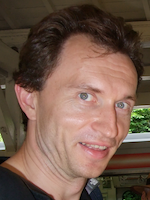- Prof. Masayuki Ohzeki
(Tohoku Univerisity, Tokyo Institute of Technology, Japan)

Masayuki Ohzeki graduated with a Ph.D. in physics from Tokyo Institute of
Technology in 2008, and subsequently spent one and a half years as a
postdoctoral fellow.
He worked as an assistant professor in the Kyoto University.
Since 2016, he has been an associate professor at the Graduate School of
Information Sciences at Tohoku University.
His research interests are broad, including machine learning and its potential
from a perspective of theoretical physics and itself.
He was awarded the 6th Young Scientists' Award of the Physical Society of
Japan, and the Young Scientists' Prize by The Commendation for Science and
Technology by the Minister of Education, Culture, Sports, Science and
Technology in 2016.
- Prof. Ali Sheikholeslami
(University of Toronto, Canada)

Ali Sheikholeslami is a Professor in the Department of Electrical and Computer
Engineering at the University of Toronto and the Head of the Fujitsu
Co-Creation Research Laboratory at the same university.
His research interests are in analog and mixed-signal circuit design,
wireline communication, and hardware annealing for beyond CMOS Scaling.
He has co-authored over 100 journal and conference publications, 10 patents,
and a graduate-level textbook entitled "Understanding Jitter and Phase Noise".
- Dr. Alan Mishchenko
(University of California Berkeley, USA)

Alan Mishchenko graduated with M.S. from Moscow Institute of Physics and
Technology (Moscow, Russia) in 1993 and received his Ph.D. from Glushkov
Institute of Cybernetics (Kiev, Ukraine) in 1997.
In 2002, he joined the EECS Department at University of California, Berkeley,
where he is currently a full researcher.
His research is in computationally efficient logic synthesis and formal
verification.






